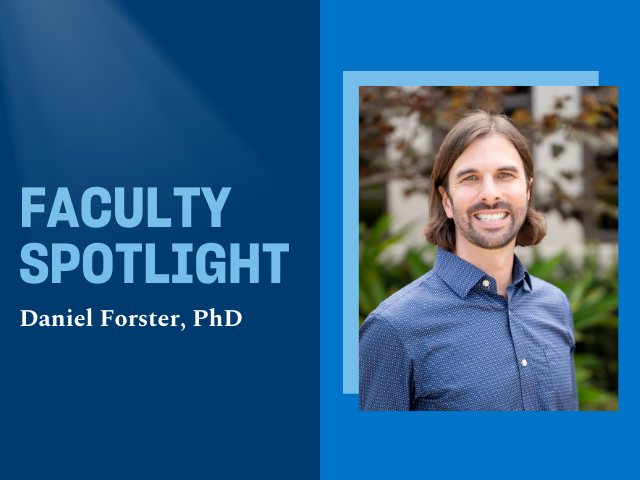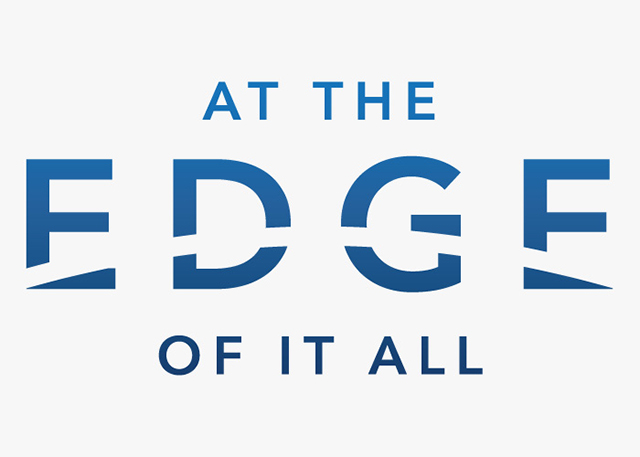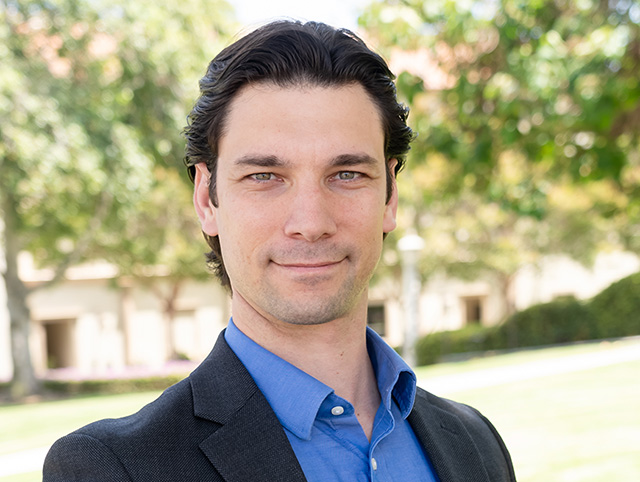Faculty Spotlight: Q&A with Daniel Forster, PhD

The USD College of Arts and Sciences (the college) hired 14 new faculty members in three distinctive themes – Borders and Social Justice, Technology and the Human Experience and Climate Change and Environmental Justice – this past fall. As part of the university's commitment to academic excellence, the college endeavored to assemble a cohort of teacher-scholars who offer a strong contribution to the diversity and excellence of USD through teaching, scholarship, service and collaboration.
This spring semester, the college is featuring each new faculty member with a Q&A series every week. Each spotlight highlights their professional journeys, academic expertise, research and their goals for fostering academic and personal growth within the USD community.
Learn more about Assistant Professor of Psychological Sciences Daniel Forster, PhD, his background and his passion for research and teaching in the Q&A below.
Cluster-Themes: Borders and Social Justice and Technology and the Human Experience
Q: Please share your name, title, department and the subjects or courses you will be teaching at USD.
A: My name is Daniel Forster, and I’m an assistant professor in the Department of Psychological Sciences. I primarily teach statistics and research methods alongside social psychology, which is also my main research focus.
Q: What key experiences have shaped your career and where you are today?
A: I attribute my successes to my supportive family, friends and educators. The experiences that directly propelled me into this position occurred about halfway through my college career when one of my close friends convinced me to work as a research assistant in my professors’ laboratories. I learned the importance of getting to know my professors outside of the classroom, which allowed me to understand the commonalities and diversity among the experiences that brought them all toward academia, and I found that my interests and values were closely aligned with that lifestyle.
Q: What sparked your interest in the Borders and Social Justice and Technology and the Human Experience cluster-themes, and what drew you to this particular focus? How are you contributing to that focus in your work here?
A: When I read the description of Borders and Social Justice, I was captivated by the idea of ‘borders’ as social, political, cultural and physical constructs. This perspective led me to consider the social psychological barriers that hinder mutually beneficial relationships. My research on interpersonal forgiveness, which I've pursued since graduate school, aims to uncover the factors that help people confront transgressions and repair their relationships.
Similarly, my interest in Technology and the Human Experience is rooted in studying how Artificial Intelligence (AI) affects interpersonal dynamics. While at the Army Research Laboratory, I researched how AI influences team trust and cohesion. At USD, I look forward to collaborating with the Army and others to explore AI's impact on interpersonal dynamics.
Q: What aspects of joining the University of San Diego community are you most excited about?
A: I am most excited to interact with students and help them through some of their most challenging courses, especially statistics. I have already seen firsthand how motivated students are to learn and how willing they are to face unknown challenges. I hope to stoke students’ interest in lifelong learning, whether that means being actively engaged in the research process or being an interested and informed consumer of scientific discoveries.
Q: How do you envision your course curriculum contributing to the academic and personal growth of USD students?
A: I fully recognize the bias in my perspective, but I truly believe that statistical literacy is applicable to everyone. Our world is dominated by data, but most people often forget that how we collect and analyze data has major implications for how we interpret our findings. It is when we try to understand cause-and-effect relationships that our detrimental biases and misconceptions rear their heads. I am working hard to make sure that students who take my courses gain a healthier balance of skepticism in what they learn, humility in what they believe they know and confidence in their ability to overcome common pitfalls.
But beyond statistical literacy, I have the pleasure of teaching my students to hone their organizational and critical thinking skills, to identify patterns in information and to use their pattern-recognition abilities to make the tedium of crunching numbers into something that can be efficient, informative and, dare I say…fun?
Q: What current research projects are you working on or interested in, and how do they align with your cluster theme?
A: I am working with two research assistants to understand why people feel grateful when they receive help. Gratitude is a fundamental social emotion that drives our desire to build new relationships and keep our valuable relationships going. With respect to Borders and Social Justice, when people experience gratitude, they are more inclined to extend their help to others, which may help to bridge social divides. I also conduct much of my research in online environments, and I am interested in understanding how virtual environments change how people experience gratitude and other social emotions.
Q: What’s an interesting or unique fact about yourself that others might not know?
A: I have too many hobbies to be good at any of them, but that doesn’t stop me from living out my youthful exuberance through skateboarding, playing music and, when I have the time, putting together circuits that make my guitar sound whacky.



